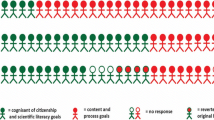Abstract
This paper outlines the findings of a study which involved expert/committed female primary science teachers and examined their perceptions of the main factors that led to the development of their expertise. The study focuses on the women's formal education, early influences outside formal education and their recent training and development. The last of these is the main one identified in research literature as having influenced people to develop an interest in teaching primary science.
Similar content being viewed by others
References
Bearlin, M. (1990). Towards a gender-sensitive model of science teacher education for women primary and early childhood teachers.Research in Science Education, 20, 21–30.
Bell, B., Kirkwood, V. & Pearson, J. (1990a). Learning in Science Project (Teachers Development): the framework.Research in Science Education, 20, 31–40.
Bell, B., Kirkwood, V. & Pearson, J. (1990b).The framework-1990 working paper 406,A learning in Science projects (Teacher Development). Hamilton NZ: Centre for Science and Mathematics Education Research, University of Waikato.
Bell, B. (Ed.) (1993).I Know about LISP but how do I put it into practice? Final report of the learning in science project (teacher development) Hamilton NZ: Centre for Science and Mathematics Education Research, University of Waikato.
Crawford, G., & Zeegers, Y. (1993). Sci-Tec: evaluating a non deficit model of inservice.Research in Science Education, 23, 24–33.
Education Department of South Australia (1988).Directions: a summary of the report of the primary education review. Adelaide, SA Government Printer.
Goodrum, D., Cousins, J. & Kinnear, A. (1992). The reluctant primary school teacher.Research in Science Education, 22, 157–162.
Handley, H., & Morse, L. (1984). Two year study relating to adolescents' self-concept and gender role perceptions to achievements and attitudes towards science.Journal of Science Research Teaching, 21(6), 599–608.
Harding, J. (1983).Switched off: The science education of girls London: Longman for Schools Council
Ives, R. (1984). The maleness of science.Australian Science Teachers Journal, 30(1), 15–20.
Kahle, J. B. (1988). Gender and science education II. In P. Fensham (Ed.),Development and dilemmas in science education. London: Falmer Press.
Keller, E.F. (1982). Feminism and science.Signs, 7(3), 589–602.
Kelly, A. (1987). The construction of male science. In A. Kelly (Ed.)Science for Girls. Milton Keynes: Open University Press.
Kirkwood, V., Hardy, T. & Bearlin, M. (1990). Outcomes of the primary classroom and early childhood science and technology education project at the University of Canberra.Research in Science Education, 20, 141–151.
Overfield, K. (1981). Dirty fingers, grime and slag heaps: purity and the scientific ethic'. In D. Spender (Ed.)Men's studies modified: the impact of feminism on academic disciplines. Oxford: Pergamon Press.
Napper, I. & Crawford, G. (1990). Focus folklore: reflections of focus teachers on the Sci-Tec Inservice Project.Research in Science Education, 20, 200–229.
Rennie, L., Parker, L. & Hutchinson, P. (1985).The effects of inservice training on teacher attitudes and primary school classroom climate Research report. number 12 Perth: University of Western Australia.
Rosser, S.V. (1990).Female friendly science: applying women's studies methods and theories to attract students. New York: Pergamon Press.
Whyte, J. (1985). Girl friendly science and the girl friendly school. In Whyte, Deem, Kant & Cruickshank (Eds.)Girl friendly schooling. London: Methuen.
Yates, S., & Goodrum, D. (1990). How confident are primary school teachers in teaching science?Research in Science Education, 20, 300–305.
Author information
Authors and Affiliations
Additional information
Specializations: training and development, primary science and technology curriculum development.
Rights and permissions
About this article
Cite this article
Paige, K. Factors perceived to have enabled 25 women to develop expertise to teach primary science. Research in Science Education 24, 246–252 (1994). https://doi.org/10.1007/BF02356350
Issue Date:
DOI: https://doi.org/10.1007/BF02356350




